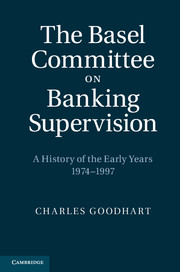Book contents
- Frontmatter
- Contents
- Figures
- Tables
- Foreword
- Preface
- 1 Introduction
- 2 The antecedents of the BCBS
- 3 Modus operandi
- 4 The Concordat
- 5 External and foreign exchange issues
- 6 Capital adequacy and the Basel Accord of 1988
- 7 The Market Risk Amendment
- 8 The Core Principles of Banking Supervision
- 9 Liquidity
- 10 Off-balance-sheet exposures and derivatives
- 11 Other topics addressed by the BCBS
- 12 The relationship of the BCBS with banks and other banking regulators
- 13 Relationships with other non-bank oversight and supervisory bodies
- 14 The legal position of the BCBS
- 15 The international relations of the BCBS
- 16 The BCBS and the social sciences
- 17 Epilogue
- Bibliography
- Index
2 - The antecedents of the BCBS
Published online by Cambridge University Press: 07 September 2011
- Frontmatter
- Contents
- Figures
- Tables
- Foreword
- Preface
- 1 Introduction
- 2 The antecedents of the BCBS
- 3 Modus operandi
- 4 The Concordat
- 5 External and foreign exchange issues
- 6 Capital adequacy and the Basel Accord of 1988
- 7 The Market Risk Amendment
- 8 The Core Principles of Banking Supervision
- 9 Liquidity
- 10 Off-balance-sheet exposures and derivatives
- 11 Other topics addressed by the BCBS
- 12 The relationship of the BCBS with banks and other banking regulators
- 13 Relationships with other non-bank oversight and supervisory bodies
- 14 The legal position of the BCBS
- 15 The international relations of the BCBS
- 16 The BCBS and the social sciences
- 17 Epilogue
- Bibliography
- Index
Summary
Introduction
The primary reason for the foundation of the BCBS was the implications for the monetary authorities of the growing globalisation of financial intermediation. This occurred slowly, but steadily, in the aftermath of World War II, as exchange controls and other direct restrictions on financial flows were removed, eroded or evaded, and as international communication improved. Whereas financial markets and intermediation became international (monetary) control and regulatory systems remained national, if only because legal systems and powers remained nationally based.
So there was a need to establish communication networks among national authorities, where consequential common problems could be discussed, and cooperation sought, perhaps leading on to convergence of policies. At the beginning of the 1970s this generated two separate strands of international cooperation on financial regulation. The first, and less well known, is the Groupe de Contact, established in 1972 to discuss common cross-border problems for banking regulations within the Common Market, the EEC (European Economic Community).
- Type
- Chapter
- Information
- The Basel Committee on Banking SupervisionA History of the Early Years 1974–1997, pp. 10 - 50Publisher: Cambridge University PressPrint publication year: 2011
- 7
- Cited by



